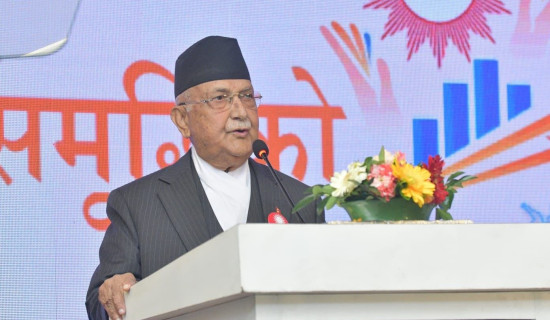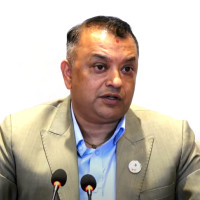- Friday, 20 February 2026
Making Democratic Republic Work For People
We celebrate Republic Day on Jestha 15 (by the end of May month) every year. A Republican polity is indeed an augmented type of democracy because it not only carries the ideals and values of democracy but also discards the hereditary rule of a family or clan. The concept of republicanism was strongly influenced by the American Revolution and the French Revolution in the 1770s and 1790s, respectively. In these two examples, Republicans tended to reject inherited domineering elites, aristocracies, and absolute monarchies. Republicanism, as it is entwined with democracy, includes the key principles of rule by consent of the governed and sovereignty of the people. In effect, republicanism holds that kings and aristocracies should not be the real rulers, but rather that people should have a say in governing the state.
The term republic usually refers to a representative democracy with an elected head of state, like the US president, who serves for a limited term. The Republican presidency is in contrast to states with a hereditary monarch with limited powers, such as in the UK. It intends to ensure that the inalienable rights of life, liberty, and the pursuit of happiness would not be trampled by the coercive power of the state or the whims of a monarch. However, in many situations, especially in Latin America and African countries like Zimbabwe, the republican presidency has degenerated into a kind of dictatorship, trampling all the values and principles of republicanism. The rule of Rajapakshes in Sri Lanka offers an instance in this regard.
We are nearing a decade and half since we established a democratic republican polity in Nepal. The democratic republic has come to Nepal at a huge cost and with huge sacrifices. To give enduring value, set up epoch-making changes, and institutionalise republican system, the federal democratic constitution authored by the popularly mandated constituent assembly was promulgated and enacted in Nepal in 2015. We have overthrown the monarchy and replaced it with the president. But if one looks at history with a sense of objectivity and a larger national unity perspective, the monarchical institution cannot be faulted for every wrong that has befallen the country. Prithvi Narayan Shah should be credited for the making and unification of the Nepali state that is in its present shape today. Kings like Birendra should be hailed for conceding to the democratic change in the country. Anyhow, we did elect to abolish the monarchical institution, anticipating that the democratic welfare of the people will be uppermost goal of the state. With this expectation in view, thousands of Nepali people sacrificed their lives, and hundreds of thousands of people suffered in their battle for the values and ideals of democratic republicanism.
However, contemporary political developments illustrate that the wishes and aspirations of the people have not been taken care of properly. The democratic institutions have not become fully functional. The way public institutions are made to work at the whims and mercy of party leaders indicates the extent to which state policy executors can abuse public resources to serve their own vested interests. This problem should be cured with accountability and good governance. It is often said that getting the concept and institutions of democracy or republicanism introduced in a country is challenging; no less daunting is making them institutionalised and sustainable. We have wasted time and resources for the last several years serving our own vested interests. It was our incessant bickering over the worthless. Issues and causes dictated and motivated by our own partisan and self-centred interests that we destroyed and maligned the courts, bureaucracy, and police organisations devoid of any sense of responsibility and accountability to the nation.
The wrangling over the appointment of key public positions and the trend of spoil sharing (Bhagbanda) indicate the dominance of sheer partisan interests at the cost of the glory and majesty of the public institutions. It is relevant to quote Robert A. Dahl, the reputed US political scientist of contemporary times, who in his celebrated work on democracy has blamed the political tendencies and behaviours in developing countries for challenges to institutionalise the democratic republic. He writes, "With the visible failures of the totalitarian systems of military dictatorships and many other authoritarian regimes, anti-democratic ideas, beliefs and ideologies lost their previous appeal throughout much of the world. Never before in human history so many people had supported democratic ideas and institutions. Similarly, democratic republicanism can be reversed and rolled back, or the basic tenets and practises of democracy can be overruled, as has happened in many countries where democracy has either failed to deliver or been appropriately institutionalised."
The setback meted out to democratic republicanism is called the reversal of democracy. This has occurred in several nations at different times in history. This has primarily happened due to the deviousness of political leadership or the systemic failures of democratic regimes to address the needs and aspirations of the people. The growing inability to provide welfare, prosperity, equity, justice, domestic order, or security has caused the reversal of democracy.
It is therefore necessary that democracy and the ideas of republicanism be strengthened through performance and delivery to meet the aspirations of the people. It is necessary to assure that democratic republican polity not only deliver but are also practiced as a way of life for the people. The democratic institutions need to hold by their democratic promise by enhancing citizen participation so that the exercise of power at all levels of political authority is based on the consent and participation of the governed. This entails maximising the accountability and transparency of the holders of political power and bureaucratic offices at all levels.
(The author is associated with Policy Research Institute as a senior research fellow. rijalmukti@gmail.com)















